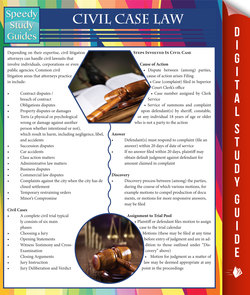Читать книгу Civil Case Law (Speedy Study Guides) - Speedy Publishing - Страница 2
На сайте Литреса книга снята с продажи.
ОглавлениеCIVIL CASE LAW
Depending on their expertise, civil litigation
attorneys can handle civil lawsuits that
involve individuals, corporations or even
public agencies. Common civil
litigation areas that attorneys practice
in include:
• Contract disputes /
breach of contract
• Obligations disputes
• Property disputes or damages
• Torts (a physical or psychological
wrong or damage against another
person whether intentional or not),
which result in harm, including negligence,
libel, and accidents
• Succession disputes
• Car accidents
• Class action matters
• Administrative law matters
• Business disputes
• Commercial law disputes
• Complaints against the city when the city has declined settlement
• Temporary restraining orders
• Minor’s Compromise
Civil Cases
• A complete civil trial typically consists of six main phases
• Choosing a Jury
• Opening Statements
• Witness Testimony and Cross-
Examination
• Closing Arguments
• Jury Instruction
• Jury Deliberation and Verdict
STEPS INVOLVED IN CIVIL CASE
Cause of Action
• Dispute between (among) parties,
cause of action arises Filing
• Case (complaint) filed in Superior
Court Clerk’s office
• Case number assigned by Clerk Service
• Service of summons and complaint upon defendant(s) by sheriff, constable, or any individual 18 years of age or older who is not a party to the action
Answer
• Defendant(s) must respond to complaint (file an answer) within 20 days of date of service
• If no answer filed within 20 days, plaintiff may obtain default judgment against defendant for amount claimed in complaint
Discovery
• Discovery process between (among) the parties, during the course of which various motions, for example motions to compel production of docu ments, or motions for more responsive answers, may be filed
Assignment to Trial Pool
• Plaintiff or defendant files motion to assign
case to the trial calendar
Motions (these may be filed at any time
before entry of judgment and are in
addition to those outlined under
“Discovery” above)
• Motion for judgment as a matter of
law may be deemed appropriate at any
point in the proceedings
